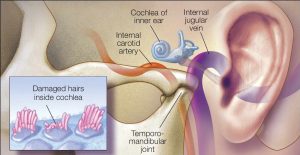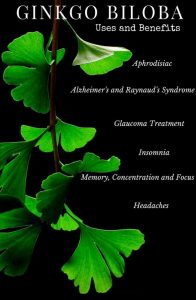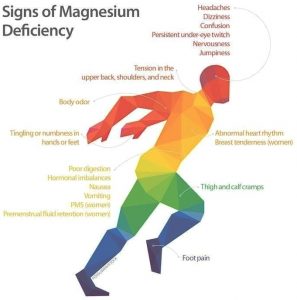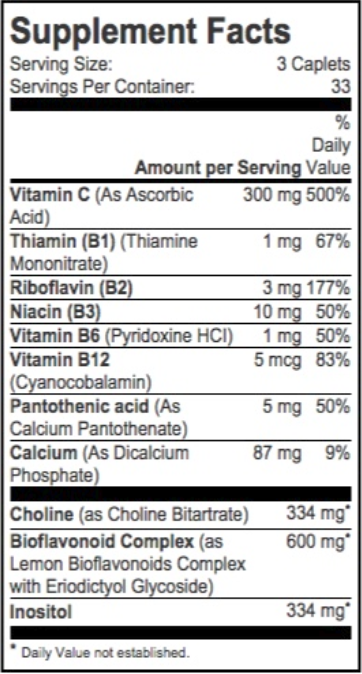![Lipo Flavonoid Plus Review: Ringing Ears HELP? [2024]](https://www.wellnessgeeky.com/wp-content/uploads/2017/12/lipo-flavonoid-logo.png)
Lipo-Flavonoid Plus is a natural bioflavonoid supplement that is used for treating tinnitus, ringing or buzzing in the ears, or Meniere’s syndrome. If you've seen or heard of bioflavonoids, it's probably from seeing the label on a bottle of vitamin C or a similar supplement.
A bioflavonoid (or flavonoid) is a naturally-occurring phytonutrient found in the skin of fruits and vegetables. The reason you see them most often in vitamins, like vitamin C, is because they help the body break down and absorb the essential benefits of the vitamin.
Bioflavonoids are present in many fruits, especially citrus, and are used to treat and promote myriad health benefits and conditions, from heart health to boosting the immune system.
Lipo-Flavonoid Plus contains lemon bioflavonoids to be exact, which contain eriodictyol glycoside.
It is the eriodictyol glycoside specifically that has been found to be effective in treating tinnitus.
To understand whether or not it's effective and might be for you, what people are saying, and where to buy, read on.
What is Tinnitus?
 Tinnitus is the condition of a constant or intermittent ringing, buzzing, or chirping sound in one or both ears.
Tinnitus is the condition of a constant or intermittent ringing, buzzing, or chirping sound in one or both ears.
It shows up most frequently in people between the ages of 40 and 60, though it can affect those both younger and older.
It can manifest for short periods of time and then disappear just as quickly.
After attending a concert, for example, or being exposed to extremely loud noise, you might contract tinnitus for a few hours to up to a few days.
If tendinitis sticks around for longer than a few weeks or days, you have what's referred to as chronic tinnitus, which can be a more significant problem.
Studies done by the American Tinnitus Association show that roughly 15% of the public, approximately 50 million Americans, suffer from tinnitus.
And tinnitus relief tips are some of the most sought-after answers on the web.
Causes and Treatments
Vitamin Deficiency
 Among all, one of the most asked questions about tinnitus is, what vitamin deficiency causes ringing in the ears?
Among all, one of the most asked questions about tinnitus is, what vitamin deficiency causes ringing in the ears?
While doctors aren't sure what causes tinnitus, there are some theories that explore whether diet and lack of proper nutrition can be contributors.
In those cases, if the diet is a factor, the likely culprits are vitamins E, D, and B12, but there are no hard medical facts to support this theory.
When it comes to vitamin deficiencies and ailments such as tinnitus, the results are too mixed to establish certainty because the cause is unclear.
Ginkgo Biloba
 In addition to vitamins and dietary supplements, natural remedies have been touted as helping ease symptoms.
In addition to vitamins and dietary supplements, natural remedies have been touted as helping ease symptoms.
For example, naturopaths have been exploring the hypothesis, "Is Ginkgo biloba good for tinnitus?" and testing it in trials.
While reviews and testimonials, success rates are again mixed, in some studies and cases, patients have reported relief from symptoms.
But similar to most unregulated herbal supplements, it's unclear why it seems to work for some but not all patients.
And as far as scientific data, there is no actual proof that ginkgo biloba is an effective treatment.
Magnesium Deficiency
Similarly, as well as exploring nutrients and vitamins, there's also research being done to investigate mineral deficiency as a potential factor.
Researchers are asking questions like, can magnesium deficiency cause ringing in the ears?
Every cell in our bodies needs and relies on magnesium, yet of all minerals, it tops the list for the highest deficiency in most people.
Magnesium is beneficial in keeping us calm and stress-free, and it's useful in treating irregular heartbeats, cramps, high blood pressure, and asthma attacks. It's our body's natural calming agent.
 Magnesium also serves to protect the inner ear nerves by inhibiting the overproduction of glutamate.
Magnesium also serves to protect the inner ear nerves by inhibiting the overproduction of glutamate.
When sound hits the tiny hair cells in our inner ears, it produces glutamate.
That production can go awry, producing sound waves that aren't caused by external occurrences, like loud noises.
That can cause tinnitus, and magnesium can keep that l-glutamate over-production at bay.
At the end of the day, researchers haven't isolated the exact cause (or causes) of tinnitus. It could be caused by a vitamin D deficiency, a magnesium deficiency, or age.
As we get older, the little hair cells deep inside the inner ear, in the cochlea, become damaged, which can cause tinnitus, which is sometimes accompanied by hearing loss.
While not life-threatening, tinnitus can lead to stress, sleeplessness, dizziness, or more serious health problems like depression, dizziness, sleeplessness, and chronic illness.
Lipo Flavonoid Plus
While neither scientists nor doctors have found a reliable treatment that works for everyone affected 100% of the time, many people find relief through behavioral cognitive therapy, hearing aids or other sound-masking devices, stress management, and by taking certain dietary supplements.
 In addition to the lemon citrus phytonutrient eriodictyol glycoside, Flavonoid Plus caplets contain the ingredients of vitamins B-2, B-1, C, B12, B6, and Niacin.
In addition to the lemon citrus phytonutrient eriodictyol glycoside, Flavonoid Plus caplets contain the ingredients of vitamins B-2, B-1, C, B12, B6, and Niacin.
These are formulated to work in combination to improve circulation in the inner ear, which in turn can ease the symptoms of tinnitus.
The recommended dosage is two caplets three times a day after a meal for two months.
Many reviewers report that it can take up to two or three weeks to start working, and others say it reduced their tinnitus completely, some by half.
As stated earlier, the efficacy is uncertain. Some people report that it completely cured their tinnitus, while others say it did nothing to help their symptoms.
Side effects are rare but can include a rash, which most likely suggests an allergy. In worst cases, stomach aches have been reported, but not frequently.
The most widely reviewed side effect is a lack of effectiveness.
To create an improved sleep environment, they are now also offering Sonorest Sleep Tones designed by experts for the ambient noise needs of tinnitus sufferers to help them fall asleep and relax.
Basically, it makes no difference for some people. This is very common among supplement remedies, and is a frustration in the scientific community, as there's no hard evidence to support why it works only for some people.
Does Lipo-Flavonoid Actually Work?
Lipo-Flavonoids are a subcategory of flavonoids that are relatively new in the cosmetic and health-food world. Of the roughly 5,000 flavonoid compounds that exist, lipo-flavonoids are less than 1% of the number of flavonoids that occur naturally in plant sources. However, some lipo-flavonoids are amongst the most potent in nature. Lipo-Flavonoids, which include epicatechin, quercetin, and other flavonoids, are some of the most powerful antioxidant phytochemicals that exist.
They have been proven in numerous studies to offer a multitude of benefits for your health. Unlike other non-steroidal anti-inflammatory drugs (NSAIDs), lipo-flavonoids have not been known to produce an inflammatory response in the body. Lipo-flavonoids may even have anti-inflammatory benefits that are greater than those of the active compounds found in aspirin and other NSAIDs.
Frequently Asked Questions
Does Lipo-Flavonoid Help Ear Ringing?
Yes, Lipo-Flavonoid is a dietary supplement that has been marketed as a potential treatment for ear ringing, medically known as tinnitus. It is formulated with a combination of vitamins, minerals, and proprietary citrus bioflavonoids, designed to improve inner ear circulation and reduce the symptoms of tinnitus.
Some studies have explored the effects of Lipo-Flavonoid on tinnitus, suggesting that the supplement may provide relief for some individuals. The citrus bioflavonoids in Lipo-Flavonoid are believed to have antioxidant properties, which may help protect the delicate structures in the inner ear from damage caused by free radicals and oxidative stress.
Despite the promising outcomes reported by some users, it is essential to note that the scientific evidence supporting the efficacy of Lipo-Flavonoid for tinnitus is still limited and somewhat inconclusive. Tinnitus is a complex condition with various underlying causes, and the response to any treatment can vary significantly from person to person.
Therefore, while Lipo-Flavonoid may be worth considering as a complementary approach to managing tinnitus, individuals experiencing ear ringing should always seek professional medical advice. A comprehensive evaluation by an audiologist or an ENT specialist can help determine the specific cause of tinnitus and guide the most appropriate treatment plan, which may include lifestyle modifications, sound therapy, and other evidence-based interventions.
What Deficiency Causes Ringing in Ears?
One potential deficiency that can cause ringing in the ears, known as tinnitus, is a lack of vitamin B12. Vitamin B12, also known as cobalamin, plays a crucial role in the proper functioning of the nervous system, including the auditory pathway. When the body lacks sufficient levels of vitamin B12, it can lead to nerve damage and disrupt the transmission of signals from the ear to the brain, resulting in tinnitus.
The inner ear contains hair cells responsible for converting sound vibrations into electrical signals that are sent to the brain for interpretation. Vitamin B12 deficiency may impair the health of these delicate hair cells, affecting their ability to transmit signals accurately and leading to the perception of ringing or buzzing sounds in the ears.
Other potential causes of tinnitus include exposure to loud noises, age-related hearing loss, earwax blockage, and certain medical conditions. However, in cases where tinnitus is associated with a vitamin B12 deficiency, addressing the deficiency through dietary changes or supplementation may alleviate or improve the symptoms.
Individuals experiencing persistent or bothersome tinnitus should consult a healthcare professional for proper evaluation and diagnosis. A thorough assessment can help identify the underlying cause of tinnitus and guide appropriate treatment strategies, which may include addressing nutritional deficiencies like vitamin B12 if necessary.
Does Lipo-Flavonoid Plus Really Work for Tinnitus?
Lipo-Flavonoid Plus is a dietary supplement that has been marketed as a potential treatment for tinnitus, a condition characterized by ringing or buzzing noises in the ears. While some individuals report experiencing relief from tinnitus symptoms after taking Lipo-Flavonoid Plus, scientific evidence supporting its effectiveness remains limited and inconclusive.
The primary active ingredients in Lipo-Flavonoid Plus are a combination of vitamins, minerals, and flavonoids, including choline, inositol, and several B vitamins. These nutrients are believed to support overall ear health and circulation, which may theoretically help alleviate tinnitus symptoms.
However, despite the promising premise, clinical studies investigating the efficacy of Lipo-Flavonoid Plus for tinnitus have yielded mixed results. While some small-scale studies have suggested potential benefits, larger and more rigorous trials have failed to demonstrate significant improvements in tinnitus symptoms compared to a placebo.
One of the challenges in assessing the effectiveness of Lipo-Flavonoid Plus is the subjective nature of tinnitus symptoms. The severity and perception of tinnitus can vary widely among individuals, making it difficult to measure treatment outcomes consistently. Additionally, tinnitus can have various underlying causes, including hearing loss, inner ear damage, and neurological conditions, which may require different approaches to management.
Furthermore, the U.S. Food and Drug Administration (FDA) has not approved Lipo-Flavonoid Plus specifically for the treatment of tinnitus. While the supplement is classified as a dietary supplement and is generally regarded as safe when taken as directed, it is not subject to the same rigorous testing and regulation as prescription medications.
It's essential for individuals considering Lipo-Flavonoid Plus or any other supplement for tinnitus to approach with caution and consult with a healthcare professional. A thorough evaluation by an audiologist or otolaryngologist can help identify any underlying causes of tinnitus and determine the most appropriate treatment approach.
In summary, while Lipo-Flavonoid Plus may offer some potential benefits for certain individuals with tinnitus, the scientific evidence supporting its effectiveness remains inconclusive. Further research is needed to better understand its mechanisms of action and determine its true efficacy in managing tinnitus symptoms. As with any treatment approach, it's important to weigh the potential risks and benefits and consult with a qualified healthcare provider.
Conclusion
The long and short of it is that if you have tinnitus or similar ear health issues, it is worth giving Lipo-Flavonoid Plus a try.
You can pick it up online on Amazon or at your favorite drug store, like CVS or Walgreens, or Walmart.
If there's a chance it could work to relieve your symptoms, it's worth it, given the risks are so few.